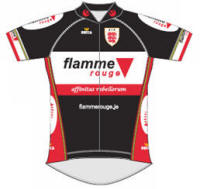Training Camps ~ Heads Up
As many of you are starting to plan and get ready for the first training camps of the year, it seems appropriate to produce a factsheet to cover this ever more important area of your season's preparation. So here goes...
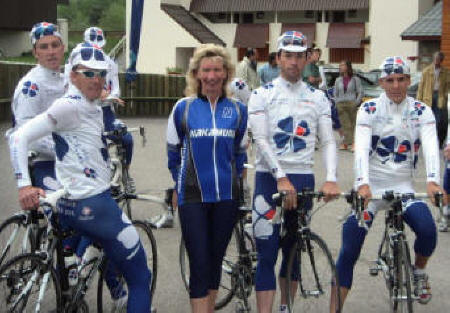
Dianne making friends at camp with a young Bernie Eisel
~ still her favourite!
Pre-trip Preparation
First things first. Why are you going on a training camp? Obviously (probably) the primary reason is to get fitter, but there are
many facets to fitness that we may need to consider.
Do you want to use your camp to kick start your season’s training or do you want to be faster, stronger, lighter, climb better, get more endurance, a good pre-season tan(!) or just ride somewhere warmer/drier/different?
Some people use them as day one of their training season and just go along to ride their bike for a few consecutive days to blow away the cobwebs gathered over the winter.
Others use them as a pre-season top-up to get some mileage in to their legs to make up for all the days lost in February when it seems to rain for three weekends out of the four!
And some use them as a sun on the back, pre-race speed fest. Where they can ride in shorts a couple of weeks before anyone else and get in some quality hours on the road.
Everyone's different; there are as many reasons to be there as there are makes of bikes. So the chance of you meeting up with someone who's exactly the same fitness level as you, with exactly the same training requirements as you, at the same stage of their training program as you, are about as slim as me the week before New Year.
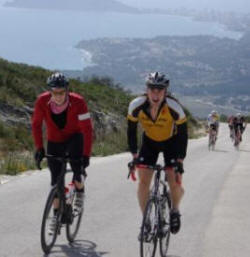 Make
sure you know why you are going before you get on the plane. Otherwise
you’re just paying a lot of money to go for some hard rides on someone
else’s training plan.
Make
sure you know why you are going before you get on the plane. Otherwise
you’re just paying a lot of money to go for some hard rides on someone
else’s training plan.
Once you've decided why you're going to a training camp you need to prepare yourself to make best use of your available time.
Understand why you're there, go with a plan, and make sure you get what you want to get from your time in the sun. Good organisers, like those listed here, will make sure you're looked after.
Having fun with John Fegan in Denia (Train in Spain)

Bike Packing
Rather than bore you with the ins and outs here, we have a
page just for this very subject with
a packing bike check-list, a video, and UK bike box hire if you
need it.
Travelling
If you've read some of the other winter factsheets on this site I'm sure
you're familiar with the stresses imposed on your body when you train.
You'll be familiar with my views on coffee stops during hard training cycles. If not, please take a few minutes to read this it could save your early season.
Welcome back. So now you know not to train hard, lower your immunosuppression system, then sit in a big room full of people you don't know and the great unwashed. If you think a warm cafe's a bad environment, imagine what sitting in an aircraft full of ne'er do wells is like?
Three hours trapped inside a sealed, air conditioned cabinet, breathing in what everyone else is breathing out and no chance to open a window. Not good when you’re as fresh as a daisy, so definitely a no-no when you're run down and open to infection.
If you have a training plan, slide your rest week to make sure you are at the right training point in your training cycle before going away. Everyone has different ways of organizing plans and many of you will be familiar with my Green/Amber/Red system so I'll work with that for now.

Green is easy, Red is hard. You don't want to get on a plane after riding a hard week. Your immune system is compromised, you're getting on a plane with others of dubious hygiene habits, and your about to go and give your body another week's worth of a hiding!
If you don’t get ill when you’re there, you most definitely will on the way back. So give this area some serious thought.
Your training camp week should, ideally, be timed to coincide, or your training plan adjusted the month before, to ensure you are there during an amber week. You're not going in to it "cold" from a grey week, and you're not hitting it at the end of a training cycle when you’re tired and potentially running in to over-fatigue.
There's no point arriving for a weeks training when you are two days from the end of a 21 day training cycle. You need reserves in the tank. So an Amber Week it is. We'll talk about what happens when you get back later.
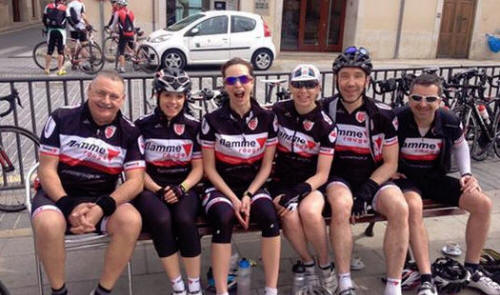
Andy Cook Training Camp Mallorca ~ flamme rougers having fun
Arriving...
Once
you've landed and are all settled in, take it easy; you've got seven
days to go. We've all seen the people who rush to the beach on the
first day of their
holidays, having never taken their shirt off outdoors in the previous fifty
weeks of the year.
They get all their kit off and spend seven hours in the sun on day one. They then spend the rest of their holiday covered up, in a darkened room, suffering from heat or sun stroke, feeling and looking terrible. Don't be the cycling equivalent.
You've just got off a plane and the chances are you're dehydrated and your immune system is working like a Trojan to keep you in some sort of condition. Don't give your body any more stress than it needs on your first day there.
Get some fluids in to yourself and get out for 60 to 90 minutes maximum, at a nice steady pace, to get your metabolism fired up and make sure everything is in working order; for both you and your bike. Get a good night's sleep and hit the ground running on day two.
Bike Hire?
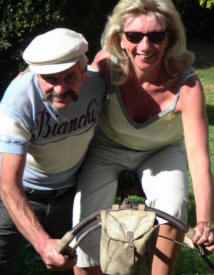 It maybe that you're going to hire a bike for the time you're away. Don't leave it until the last minute.
It maybe that you're going to hire a bike for the time you're away. Don't leave it until the last minute.
Make sure you book the right size, and get confirmation. Send your setup measurements if you can, with the basics, seat height, reach, drop, crank length etc.
I have setup sheets I can send you. If you email me I'll fire one back so there's no confusion.
Take your own pedals, shoes and saddle (in your hand luggage) and get down to the shop as soon as you arrive; before someone else (a German!) gets "your" frame. You don't want to be left with the runt of the litter.
Don't end up with a bone shaker or a bike that doesn't fit. And don't let them talk you in to taking something you're not comfortable with.
You'll be spending up to 18 hours at, say an average 85 rpm, on this bike. That's 91,800 pedal revs. If it ain't right (and you've got 170 cranks when you're a 172-er) you'll know about it when you get back!
Finally, check the brakes. Some people have them cack handed. I think it's me! Make sure that the front brake on your hire bike is in the same position as the one on your road bike.
If it's not, there's not a lot you can do about it. Just find out in the shop, not at the roundabout at the bottom of the hill on the way back to the hotel.
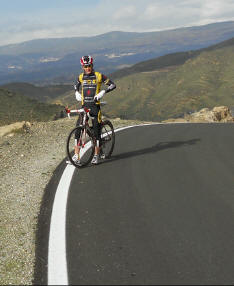 Pace Yourself
Pace Yourself
You're probably there for a week, so first things first, check out the
weather forecast for the rest of your stay. Or check with the
person in charge; in this case
Gary Williams at Vamos! Cycling
Sometimes you might just have to get wet, but knowing what's coming will allow you to change your plan early rather than on the fly.
Plans are nothing if not flexible. For now, let's assume the weather is going to be kind to us, it normally is in Cadiar, and we're ready to go with a week's sun on our back.
In a normal winter training week you may do an hour turbo on Tuesday and Thursday, a three to four hour ride Saturday and two to three hours on Sunday. All in all nine hours spread over seven days.
So what are the chances of completing six, five hour rides in the mountains then coming back and staying healthy?
We've already discussed the first day being a "recovery" day. Your last day should be considered the same.
And ideally you should take a proper recovery day in the middle of the week to allow yourself to go again, fresh for the last section of your camp. So that leaves four days to fill your boots.
By filling your boots I don’t mean four, five hour rides. If the longest you’ve ever ridden back home is four hours, then fire in a three hour ride on your first big day, then a four hour ride on your second. A 90 minute recovery ride mid-week is then followed by a five hour ride, then a four hour, then another 90 minute wind down on the last day.
| Normal Week | Training Camp | |||
| Sat | 4 hour road | 1 hr road | ||
| Sun | 3 hour road | 3 hour road | ||
| Mon | 4 hour road | |||
| Tue | 1 hour turbo | 1.5 hr recovery | ||
| Wed | 5 hour road | |||
| Thu | 1 hour turbo | 3 hour road | ||
| Fri | 1.5 hr road | |||
| 9 hours | 18 hours |
The above rides give a massive increase over your normal training week. But one of the advantages you have is that you don’t have to go to work in between sessions and can probably get quality recovery to match your quality riding.
Split Shifts
There is also the option of breaking your ride in to two
sections. It doesn't work for me but that doesn't mean it can't
work for you.
If you did a two hour ride, then took a break with a long (but not big!) lunch, and completed another two hour ride afterwards, you can get in four hours of riding. But this isn't the same as a four hour ride!
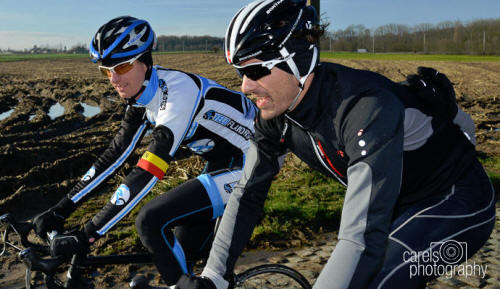
Even Cancellara has been known to do a Flanders recce with cobbles expert Steven Vanlanker of VeloFlanders
Why not have a little practice before you go away on your camp? See if this type of riding works for you, and if it does, make use of the advantages it offers. It might allow you to stretch yourself further than you have previously, but in a controlled manner.
But it's not for everyone, so don't try it on your first day there and then get the hump because it didn't give you the results you were expecting.
Crash & Burn
I’ve seen riders come back from training camps absolutely exhausted.
They then have to take a week or so recovery back home before they can undertake heavy
training again. And they’re the lucky ones.
I’ve seen others get so beat up on the rides, climbing and “competing” with riders who are a level or two above them, that they get run down before they leave for home, jump on a plane, catch a bug then spend the next two weeks off the bike totally.
All that time, effort and money wasted.
If you're going to go away and do 20 hours riding, rather than your normal 10, then have to take a week off because you're ill, you might as well have stayed at home, done two ten hour weeks and bought a pair of Zipps with the cash you've saved!
The Lost Boys
I have a tale of two riders who went for a
group ride, all testosteroned-up, with the A-riders, got shelled out, bonked, then had a
long, lonely, limp back to base.
Totally disoriented, they rode another lumpy 100k to complete the route of the day when they could have taken a 30k as-the-crow-flies, flat, valley road that would have saved them hours of undue suffering.
Get a map of the area and familiarize yourself with landmarks and general directions. You don’t want to get “lost” or separated from a group and find yourself on a five hour ride in the mountains with no food, no drink and no idea of how to get back to sanctuary!
But, you won't be the first.
With Garmins and smart-phone GPS's these days there should be no excuse. We'll talk about the ability of STRAVA to encourage burn-out another time.
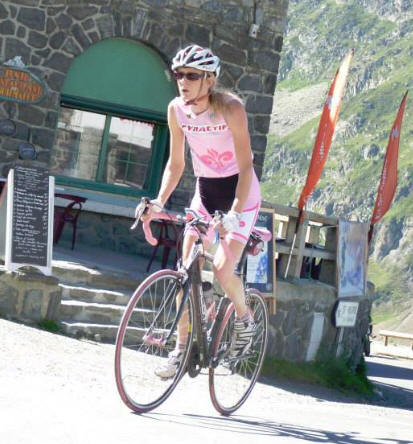
The antidote to testosterone fuelled climbing, Helen Balfour, Queen of the Pyrennees and half the Pyractif team with husband Chris. Only take her on if you are really, really sure you can beat her. But you won't...
Nutrition
We’ve all seen the riders that come back heavier from a training camp
than when they went! While it’s important to fuel the engine and eat
well and regularly during your sojourn, it’s just as important to eat
the right amount of the right stuff at the right time.
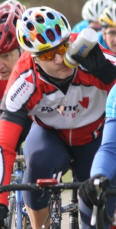 Take
your own drink and energy bars but be prepared to try other things while
you have the opportunity.
Take
your own drink and energy bars but be prepared to try other things while
you have the opportunity.
Save the deserts for the “big days” and try fruit in the morning instead of a muffin or croissant. Again, save them as a reward for the lunch stops on your big days in the mountains.
Regarding fruit, try to eat as much as you can (within reason!) and never be afraid to have one or two oranges a day to boost your vitamin C levels.
If you’re unsure of the food-risk, only eat fruit that can be peeled. And if you have a juice, avoid ice in the drink itself. Chilled drinks are okay, just not with ice cubes in them.
Same goes for salads. If you're not sure, don't eat anything that might of been washed in less than ideal conditions.
Always carry a gel with you when out on the road and stuff some local currency in to a plastic sachet in your saddle bag. Garages always have emergency bottled water and chocolate bars!
Take your own recovery drinks or bars on the trip and make sure you make best use of the 20 minute recovery window when you get back from a ride.
And always eat on the last 20 k run in back to your hotel, complex, or guest house. Today's recovery and preparation for tomorrow’s ride, starts during the finale of today’s ride.
When you do get back to base, get your pre-prepared recovery drink and bar down your throat as quickly as possible.
Don’t hang around for an hour discussing the ride in your cycling kit over a coffee, or even worse, a beer! Arrange a time for socializing after you’ve eaten, showered and downloaded your Garmin/SRM/Polar (delete as appropriate).
Post-ride conversations are always better if you can throw some impressive numbers and stats in to the fray!
Skills & Techniques
No doubt you’ll be climbing some big hills when you’re away,
so why not use the opportunity to try some different gearing and cadence
options?
Try staying in the saddle and grinding out the gears while trying to keep your heart rate down. It does work.
Then on your next ride, try the same section in a lower gear and a higher cadence and see how it "feels". This is where STRAVA can be invaluable.
Now you're on big (hopefully quiet),
open descents with time to get in to a rhythm. Why not try to
develop your descending skills. But be very careful and always remain safe; remember you'll probably be
on the "wrong" side of the road. So stay within your
comfort zone.
If there are workshops and seminars there, use the opportunity to learn something new. Especially on your recovery days.
Use your spare time wisely, don't be in a learning environment and not learn anything.
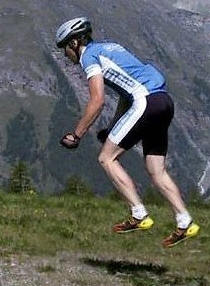 Security
Security
I’m sure your bike is very dear to you. You’d be surprised at how many people would covet
your nicely prepped race bike while you’re away. Who takes
their winter hack to a training camp?
Normally, your bike probably never leaves your sight when you’re at home, or away.
The problem comes when you’re packing up to leave for home and let your guard down. A trip in to the shops to buy a cuddly donkey could prove disastrous.
A few of our lads have previously had their bike, and loads of kit, stolen after they’d completed their training camp and were getting ready to start the return trip home.
Their bikes had been broken down, and placed inside their travel cases, along with helmets, shoes, tool bags, and all the other things they didn’t want to carry in their hand baggage.
The cases were, as instructed, left on the balconies of their apartments to allow the rooms to be cleaned for the next incumbents.
They then all went for their last visit in to town to kill the couple of hours before the transfer arrived. In that time, their bikes (along with many others) were taken.
Under perfect cover, (what’s more appropriate than a load of people moving a load of bikes in to vans on transfer day) a group of miscreants just went in, collected all the bikes from the balconies of the rooms left open, and fired them in to the back of a van. Before driving off in to the ether. Everything gone!
Lock the bike and wheels to themselves inside the case; then lock the case to something solid and in the ground. If you have to, lock them to a load of other cases (as long as they're travelling companions) so they can't be easily picked up or moved unless the lock's removed.
Even if the hotel gives you a room to put them in, LOCK THEM.
If you think this is a pain, wait until you try to process a foreign insurance claim. Don’t ruin your holiday for the sake of a couple of locks and a little personal aggro.
You wouldn't leave seven grand sitting in a corner of the room, so don't do it with your Zipp equipped Colnago, with SRM and Di2.
And speaking of locks, make sure your travel locks on your case are TSA approved. Customs, can and will, smash your locks off and damage your case if they can't get in to inspect it.
Travelling Home
Travelling back is even more fraught with infection risk than travelling
there. In the course of your week, you have just doubled, if not trebled,
your Training Stress Scores without the security and benefit of ramping up slowly.
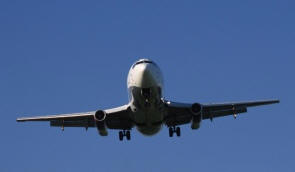
In one massive week you’ve put your immune system, your body clock and your previous training rhythm and routine under immense pressure.
You’ve seriously raised your chance of catching a bug and seriously lowered your chance of successfully holding it off.
Be mercenary and be obsessive on your trip home. Stay away from coughing, sneezing sick people and those with families! Wash your hands at every opportunity and steer clear of buffets, queues and communal gatherings. Get yourself to the chemist, and buy a small hand cleansing gel; use it frequently.
I know it’s hard when travelling with large groups but take as many precautions as you can. It’s only for a few hours and it can make a massive difference to your season.
Buy pre-wrapped food and sip drinks (preferably water) constantly to remain hydrated and to keep your nasal passages moist; they’re your first line of protection against air borne risks. You don’t need a mask or anything daft, but you do need to give nature a helping hand.
Also, try not to drink alcohol or coffee on the trip home. Save it until you’re back in the warm bosom of your loving family. Who are just dying to hear all the fantastic stories you have of your trip away! Honestly, they can't get enough of them.
Next month, we'll be discussing the etiquette of training camps and how to make yourself popular at these increasingly important cycle-fests.
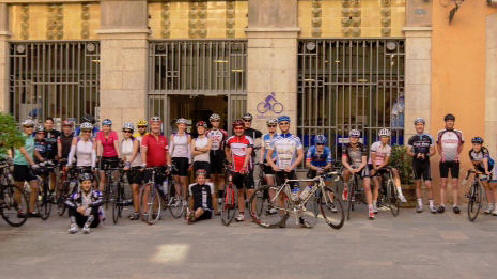
Dave & Saskia ready to roll at Bike Breaks Girona
The Message
Remember, the aim of a training camp is to allow you to train
for winning races, you’re not there to win the training races.
Get fit before you go but don’t get there tired or in a final week of a training block. The extra intensity will push you over the "staying healthy" edge.
Plan your nutrition and recovery with the same attention to detail as you plan your training.
Don’t be afraid to try something new.
Finally, check the gearing requirements. There’s no use going to the mountains with a 53 x 11 and a 39 x 21. Check the terrain, ask a few knowledgeable others and get the right gearing to help you get the right training benefit from your trip.
The idea of a training camp is to come back physically stronger, mentally revitalized and with a passion reinvigorated after riding with some sun on your back after a wet, cold, miserable winter. Make it an enjoyable experience and one that launches you in to your next training cycle.
Training camps, if I haven't put you off, are an excellent way to get fit, renew motivation and have a great time with your mates and people who have yet to become your mates. Just a little attention to a few details can make it a memorable experience for all the right reasons.
Looking for somewhere to go? Try one of those listed above, or there's more here. All have been used by members of our team and are highly recommended.
Keep safe, enjoy your trip...

